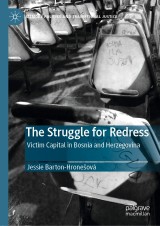Details

The Struggle for Redress
Victim Capital in Bosnia and HerzegovinaMemory Politics and Transitional Justice
|
106,99 € |
|
| Verlag: | Palgrave Macmillan |
| Format: | |
| Veröffentl.: | 05.08.2020 |
| ISBN/EAN: | 9783030516222 |
| Sprache: | englisch |
Dieses eBook enthält ein Wasserzeichen.
Beschreibungen
This book explores pathways to redress for main groups of victims/survivors of the 1992-5 Bosnian war —families of missing persons, victims of torture, survivors of sexual violence, and victims suffering physical disabilities and harm. The author traces the history of redress-making for each of these groups and shows how differently they have been treated by Bosnian authorities at the state and subnational level. In Bosnia and Herzegovina, thousands of war victims have had to suffer re-traumatising ordeals in order to secure partial redress for their suffering during 1992–1995 and after. While some, such as victims of sexual violence, have been legally recognised and offered financial and service-based compensation, others, such as victims of torture, have been recognized only recently with a clear geographical limitation. The main aim of the book is to explore the politics behind recognizing victimhood and awarding redress in a country that has been divided by instrumentalized identity cleavages, widespread patronage and debilitating war legacies. It shows how war victims/survivors navigate such fragmented and challenging public landscape in order to secure their rights.
Chapter 1. Introduction.- Chapter 2. Victim Capital for Recognition and Redress.- Chapter 3. The Bosnian Conflict, its Aftermath and Victims’ Demands.- Chapter 4. ‘Why is my leg worth less?’ Disability and the Loss of Life of Military and Civilian War Victims.- Chapter 5. Graves and Redress: Families of the Missing Persons and the ‘Srebrenica Effect’.- Chapter 6. Between Recognition and Oblivion: Victims of Sexual Violence and Torture.- Chapter 7. Victimhood, Recognition and Redress from a Comparative Perspective.
<b>Jessie Barton-Hronešová</b> is an ESRC Postdoctoral Research Fellow at the Department for International Development, University of Oxford, UK.
This book explores pathways to redress for main groups of victims/survivors of the 1992-5 Bosnian war —families of missing persons, victims of torture, survivors of sexual violence, and victims suffering physical disabilities and harm. The author traces the history of redress-making for each of these groups and shows how differently they have been treated by Bosnian authorities at the state and subnational level. In Bosnia and Herzegovina, thousands of war victims have had to suffer re-traumatising ordeals in order to secure partial redress for their suffering during 1992–1995 and after. While some, such as victims of sexual violence, have been legally recognised and offered financial and service-based compensation, others, such as victims of torture, have been recognized only recently with a clear geographical limitation. The main aim of the book is to explore the politics behind recognizing victimhood and awarding redress in a country that has been divided by instrumentalized identity cleavages, widespread patronage and debilitating war legacies. It shows how war victims/survivors navigate such fragmented and challenging public landscape in order to secure their rights.<div><b><br></b></div><div><b>Jessie Barton-Hronešová</b> is an ESRC Postdoctoral Research Fellow at the Department for International Development, University of Oxford, UK. <br></div>
Provides an analysis of the dynamics between official domestic and international authorities, as well as activists and a new war-created population seeking compensation Synthesizes various bodies of literature not only on transitional justice but also on social movements and anthropological approaches to victimhood Explores the political exploitation of the various frames of victimhood and the strategies used by victims
"In this meticulously researched and clearly presented study, Jessie Barton-Hronešová makes significant contribution to understanding the importance of victim-centric aspects of transitional justice. The book should be read by students, scholars of transitional justices and peacebuilding, and policy makers for its insightful and useful account of the challenges to meaningful victim redress to support peace and reconciliation in the aftermath of war." <div>— Vesna Bojičić-Dželilović, Senior Research Fellow, London School of Economics, UK<br></div><div><br></div><div>“The Struggle for Redress: Victim Capital in Bosnia and Herzegovina makes an excellent contribution to the existing scholarship on transitional justice and our understanding of the politics of post-war Bosnia-Herzegovina. Barton-Hronešová’s analysis of the financial compensation of war victims is meticulous and extremely revealing of power and responsibility in this divided and politically fragmented state. The monograph will be widely cited and read by those with an interest in the region, the politics of transitional justice, and the broader challenge of post-conflict reconstruction."<br></div><div>— Adam Fagan, Professor of European Politics, King’s College London, UK<br></div><div><br></div><div>"Why are the needs of some victims addressed and the needs of others ignored? Jessie Barton-Hronešová explores the landscape of victim political mobilisation in Bosnia and Herzegovina, and sets out in detail the political, legal, contextual, and social constraints with which victim activists are faced, and how they are addressed. In the process she reshapes the reader's view of victims: they are not objects to be deployed in political arguments or romanticised, but active participants navigating their way through a frequently hostile institutional environment. This work makes an important contribution to how we understand victims, their needs, and how some needs are or are not met. It is essential for any reader hoping to understand post-conflict environments."<br></div><div>— Eric Gordy, Professor of Political and Cultural Sociology, University College London, UK<br></div>
Diese Produkte könnten Sie auch interessieren:

Inclusión educativa de niños, niñas y adolescentes migrantes venezolanos, en Colombia

von: Douglas Jiménez

15,99 €
















